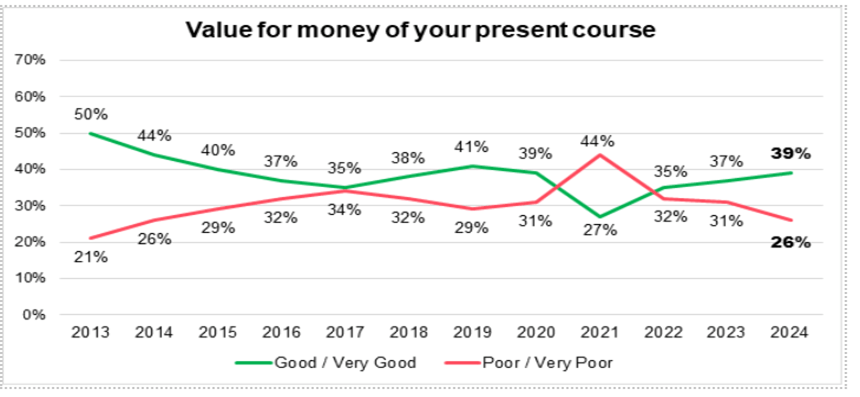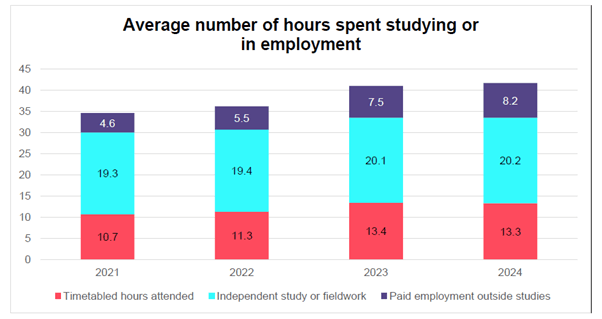Over 10,300 full-time undergraduates have responded to the Advance HE and HEPI Student Academic Experience Survey 2024.
The findings reveal an increasingly positive student experience with an improvement in perceptions of value for money from their course, greater satisfaction with contact hours and teaching – particularly in assessment – and their expectations being met.
At the same time, the cost-of-living crisis is affecting students’ mental health and their overall perceptions of value, while increasing their workloads.
The report's authors say:
“As this year’s SAES results attest, higher education institutions are remarkably resilient, delivering an improved experience despite increasing financial pressures on the sector. And the same is true for students, who face greater pressures on their time and cost of living for another year running.”
Among the key findings are:
- A recovery in value for money perceptions to pre-pandemic levels and a marked decline in those whose perception is of ‘poor’ or ‘very poor’ value:

The report shows that this is particularly so for international students and those from (UK domicile) Black, Asian and minority ethnic backgrounds.
- Cost-of-living concerns continue to bite and impact studies. In terms of factors impacting a negative perception of value, the cost of living was the single most significant concern (44% of responses). In another question, 28% said the cost-of-living crisis was impacting their studies ‘a lot’ (26% in 2023), and 50% said it was affecting them ‘a little’
- There has been a strong improvement in ratings of teaching and assessment, with some of the highest figures seen since the SAES began. This year, 68% (the highest figures so far) of respondents said they were satisfied with their timetable contact hours, compared with 66% in 2023 and 63% in 2022
- Despite the cost-of-living crisis and very significant concerns around mental health, the percentage of undergraduates who had considered leaving university has reduced from 28% in 2023 to 25% this year. (‘My mental/emotional health’ was the most cited reason – 28%, marginally ‘better’ than last year, 29%. ‘Financial difficulties’, was cited second, but has jumped from 8% to 11%)
- Students’ overall workload has increased, primarily driven by increases in the number of hours of paid work. Students now spend an average of 42 hours a week in paid work and study, up from 35 hours in 2021. Some subgroups, such as those who have caring responsibilities, those who commute and those aged over 26, work and study on average more than 50 hours per week.

In new questions in the Survey this year, the data show that:
Three-fifths of students (62%) use AI in their studies in a way that is allowed by their university – but there is evidence of a digital divide, with men, international students and students from higher socioeconomic backgrounds more likely to use AI tools than women, home students and those from lower socioeconomic backgrounds.
Some 80% of students are registered to vote and 68% intend to do so. This is lower than comparable results from a HEPI study back in May 2023, when 89% were recorded as being registered and 85% as intending to vote.
Alison Johns, Advance HE Chief Executive, said: “Over the past year or more, there has been a great deal of public discourse about higher education and its value. The great thing about SAES is that it is the evidenced voice of students cutting through the noise and reporting their experience as it is. We can see they are increasingly positive about their academic experience and that they are hard-working – as are the institutions and the staff where they are learning.
“Of course, the report shows where enhancements can still be made – that’s its purpose. But it also shows that the public and policy discourse needs to move on to how we achieve a sustainable financial model for the national success story that is UK higher education where all this talent can thrive for the benefit of everyone.”
Nick Hillman, Director HEPI, said: “Students have responded to the severe cost-of-living pressures by doing more paid employment alongside their academic studies. But more students, especially those from poorer backgrounds, are doing so much paid work that their studies are being adversely affected. Once the election is out of the way, it will be time for Ministers to do their bit by looking again at the level of maintenance support and by ensuring institutions have the resources to continue delivering an excellent all-round education.
“As a strong and successful higher education sector holds the key to tackling some of the country’s biggest problems – such as sluggish economic growth, low productivity and regional inequalities – we hope policymakers will respond to the lessons provided by this large, mature and instructive survey.”
The Student Academic Experience Survey is now in its 18th year. It is widely used by the sector and policy makers to inform change. Increasingly, data from the survey is used to help in the development of other reports such as Living and learning in London in 2023 (London Higher), and Student mental health in 2023 (TASO and the Policy Institute at King's College London). HEPI and Advance HE welcome these initiatives.
Read the full report: Student Academic Experience Survey 2024
Introducing Advance HE Insights
We are specialists in higher education research. Our expert team can provide, qualitative, quantitative or mixed-methods offers, underpinned by sector-wide datasets from our student surveys and our sector-leading higher education statistical reports. If you are interested in using research to drive evidence informed change, find out more about Advance HE Insights.